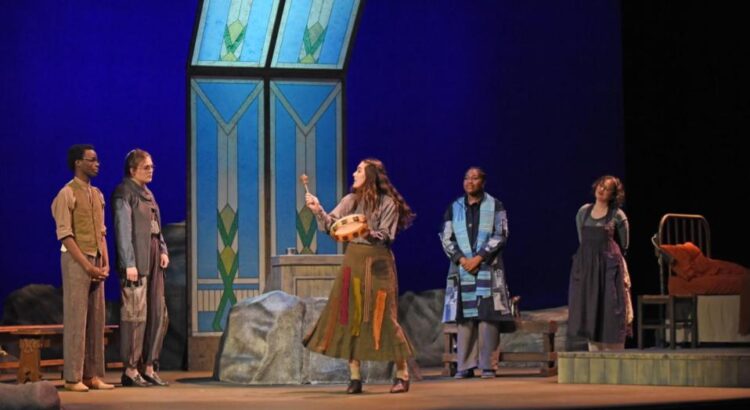7:30pm • Thursday, Feb. 15, 2023 • Lydia Mendelssohn Theater
The School of Theater, Music and Dance’s production of Arbor Falls this last week was a unique and memorable take on faith, community, and change. Arbor Falls tells the story of a small town grappling with change. A traveling stranger has come to town, granted refuge in the preacher’s small, failing church. The stranger’s presence in Arbor Falls resurfaces the old hurts and prides of the residents’ lineages, forcing them to reckon with what it means to preserve one’s history and when to move on. Having grown up in a small town, it was interesting to compare and contrast the world created in the play with my own personal experiences.
For me, the best part of this play was the script, the core around which the rest of the performance was built. The play was written by Caridad Svich, a much-awarded playwright who also translates works of theatre in English and Spanish. For me, it felt like she captured the essential characters and perspectives of a small town, then romanticized them into something altered but recognizable. Arbor Falls was like my home-town portrayed through an Art Nouveau lens, all curliques and flourishes. She wrote much of the dialogue in an unusual syntax, perhaps meant to evoke rural dialects, which engaged my curiosity. I could sort of imagine the script being read by people I grew up around, but those words felt awkward spoken in theatre students’ voices. Real but unreal.
Stylistically, the production felt untethered in time and space. The Arbor Falls onstage was like no small town I’ve ever lived in, but recognizable at the same time. Svich’s treatment of religion in the script merged the mundane with the otherworldly, and the set and costumes materialized this tension. The costumes were a bit bohemian–they reminded me of clothes you would see at a small folky music festival, or maybe a renaissance fair, made new to look old. Not like anything I’ve ever seen anyone wear, but they helped create the unique world of Arbor Falls. Similarly, elements of the set, like the preacher’s pulpit, appeared to in the process of sinking into (or emerging from) boulders. Or, perhaps, they were symbolically embedded in the land as a representation of the characters’ roots in Arbor Falls.
Overall, I thought Arbor Falls was a beautiful interpretation of how we might maintain or fail to maintain our values, how we grapple with the baggage of our heritage to navigate change. I wish I could watch it again to really grasp all of the nuances in the language, but I deeply enjoyed my experience watching this last Thursday.
Featured image from SMTD digital program.



untethered from time and space” is a great way to describe it.